The Making of Mac
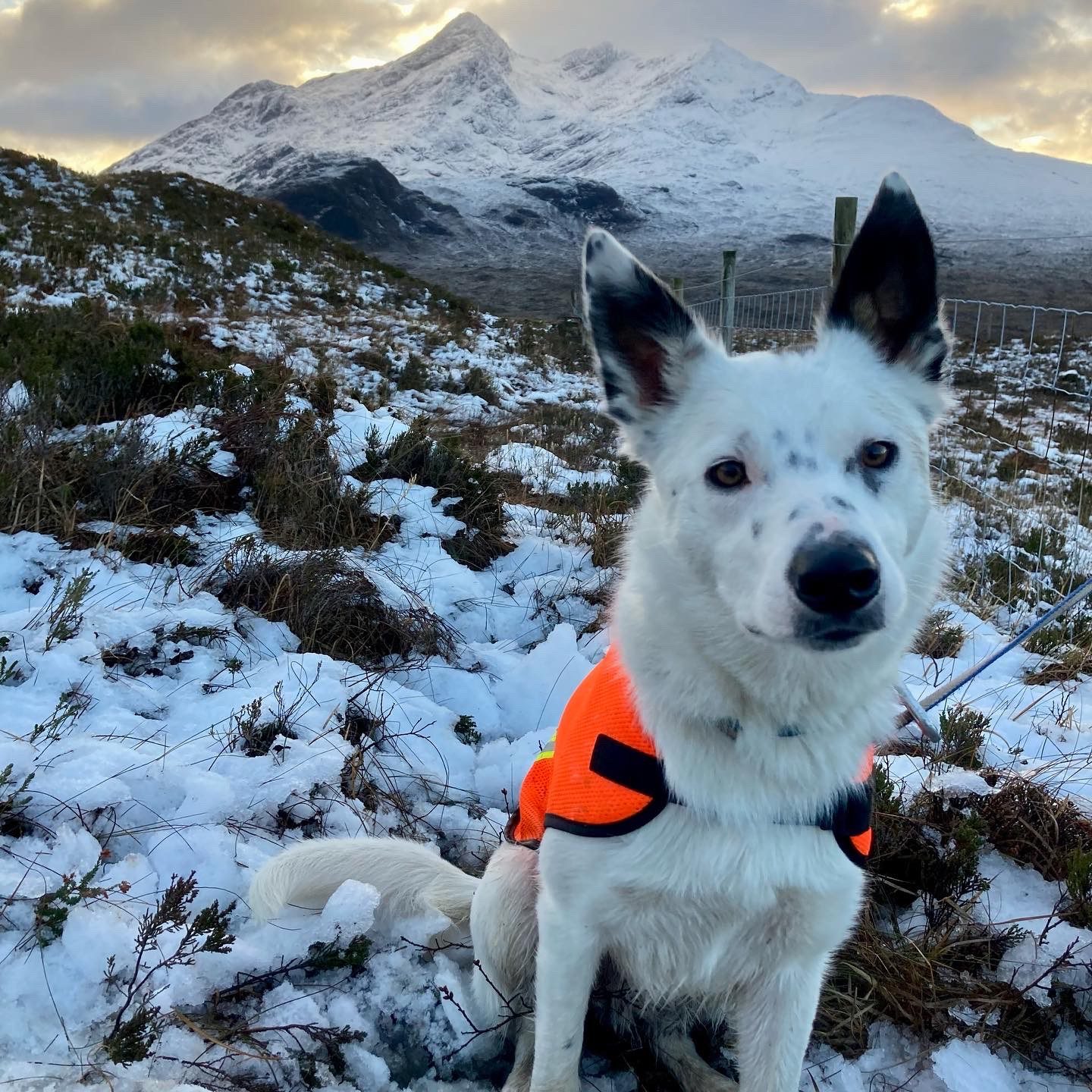
The Making of Mac
Meet the rescued pup who became a rescue dog. By Deziree Wilson, freelance writer and editor, with a passion for climbing and mountaineering.
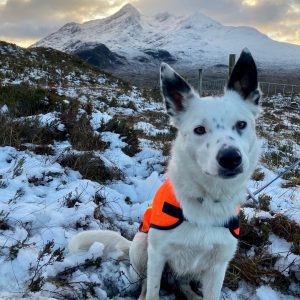
In hindsight, there had always been a Mac-shaped hole in our lives. Mark and I had grown up around dogs and his collies had accompanied him and his father into the mountains when he was a boy. As a mountain guide and member of a local Mountain Rescue team, he’d always had an ambition to train a dog for search and rescue, and after he underwent a double hip operation in October 2021, we agreed that having
a focus at home might help him on the road back to full fitness.
In fact, Mark had been secretly looking for potential matches through the Scottish Society for the Prevention of Cruelty to Animals (SSPCA) website for some time and, just before Christmas that year, he tentatively said he had “something to show me”. On the screen was a collie pup, all white except for his ears, some black splodges around his nose and
a charming teardrop on his head. It sounded as though he’d been taken from a farm where, presumably, he was being lined up to become a working dog.
He seemed just what we were looking for. We drove northwards through an increasingly bleak, frozen landscape for several hours and arrived at a windswept outpost in Thurso, where the cheerfulness of the kindly SSPCA staff seemed at odds with the surroundings.
Through the mesh surrounding a concrete pen, a lanky, ghostly figure careered around with a soft toy. Identifying potential new playmates, he dropped the battered toy at our feet and gazed up at us expectantly, amber eyes gleaming. After half an hour of playing with him
and walking him around the enclosure, we had to choose whether to take him home. It seemed too big a decision to make after such a brief encounter.
The morning after Mac’s arrival, an almighty clatter heralded a new day. I found him charging around the kitchen, having yanked the electric heater off the wall, emptied the bin and strewn his bedding around the room.
Heedless of boundaries, he ricocheted his way around the house, oblivious to pleas for calm. He’s just a puppy, I told myself, he’ll settle in a week or two.
Alas, over the following months it became clear that Mac was not your average dog. Various dog-sitters – who described him as ‘unique’, ‘challenging’ and ‘unusually active’ – fell by the wayside, having suddenly discovered hitherto unknown commitments.
Everyone commented on his adorability; none were in a hurry to look after him. Called back early from some filming work to collect him, I listened in dismay to one harassed-looking lady’s description of Mac’s accomplishments during his brief stay. These included climbing onto her kitchen worktop, escaping out the window then, from a standing start, scaling a six-foot perimeter wall, on a mission to see what was happening down the street.
When he wriggled his way into the front seat of their van through the half-open window – scratching the paintwork in the process – then gnawed her husband’s best fleece, it was the last straw.
He was suspended, pending ‘the snip’ and reflection on his behaviour. Further work was curtailed after a phone call from an unknown number. “Have you got a white dog?” Oh, God. “He’s just come into the pub in Newtonmore. I rang the number on his collar tag.” Another dog-sitter bit the dust.
Neutering Mac softened some aspects of his behaviour but it still felt like a full-time job trying to meet his needs – something I felt woefully ill-equipped for. “It’s like he’s got ADHD,” said one friend, bluntly. She was right. It was nigh on impossible to tire Mac out and Mark
and I spent hours trudging around in all weathers, trying to dissuade him from grabbing or taking off after anything vaguely interesting.
There was no doubting Mac’s intelligence and we realised that much of his frustration was because he needed a job to do. Mark’s ambition to enrol Mac in the Scottish Search and Rescue Dog Association (SARDA Scotland) meant he had already put a lot of groundwork into the basics of training, so we began working Mac harder on shorter journeys.
Finding, catching, chasing, digging, waiting, sitting, lying down… he was eager for commands and thrived on the praise and rewards he received from carrying them out. One day, he even slept for three
hours in between walks!
There is no such thing as a simple stroll with Mac. It must involve a dizzying array of games, instructions and progressive training. But much as I’ve lamented the lost freedom to do as I please, getting to know and understand Mac brings real joy.
Taking him into the mountains was a milestone – he’s extremely robust, utterly at home in wild environments and more than capable of keeping up with us on challenging terrain. Although curious, he’s surprisingly cautious, and the only challenge is persuading him
that skis (just like bikes, shovels, rakes and hoovers) aren’t monsters to be slain.
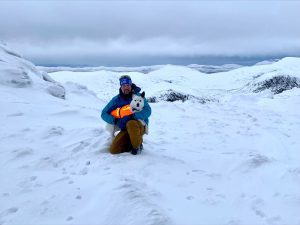
Unsurprisingly, Mac thrived when he joined SARDA and his searching skills were obvious from the outset. Dogs can work in all weather and quickly cover huge areas without losing speed. They also have more than 40 times more scent receptors than humans, and over time these are honed to detect human scent so they can assist Mountain Rescue and the police to search for missing people.
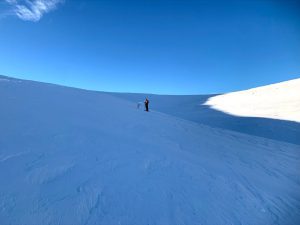
Training begins by associating finding a human volunteer ‘body’ with fun and rewards. Eager to play, Mac was encouraged to find the body then bark, or ‘indicate’, for a toy, after which he’d get a few minutes’ play time. Indicating is a key part of the process, since SARDA dogs must not only locate casualties but also attract their handler’s attention when they do so.
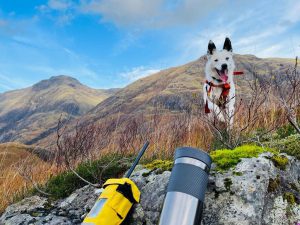
Mac has now been with SARDA for more than a year. After graduating from puppy training in 2022, he passed his stock test in February of 2023 – just. There’s no better illustration of Mac’s heritage than when he’s around livestock: he’ll instinctively creep along in a collie crawl,
ears flat, every muscle and sinew primed as he waits for instructions.
Mark had done lots of training with him in big fields but on the test day, they were directed to a small pen holding eight sheep. Mac stared in bewilderment at Mark as if to say, ‘What is this craziness?’ but, incredibly, he responded better to commands off the lead and showed enough control to please the assessors – and the farmer, who said: “If that dog doesn’t make it as a search dog, I’d have him as a sheepdog.”
During the main assessment weekend, Mac searched eight areas over three days, often for multiple bodies. As a handler, Mark is scored on his efficiency and effectiveness in planning and searching on steep, complex terrain, and how he uses the prevailing wind to move Mac over this. Mac is assessed on his confidence to range away from Mark, how he reacts to air scent, how well he follows the scent to the
body (‘strikes’) and how well he indicates.
Although Mac’s finding skills are excellent, it has taken him a while to find his voice, and this needs more work. They passed, however, becoming ‘Novice Dog and Handler’. It felt fairly momentous when they received the coveted search and rescue collar and dog tag, and it
marked another stage in the long journey Mac’s been on with us since those early days when he lacked any focus whatsoever.
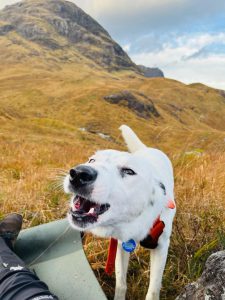
“Over the winter Mac entered the final phase of training, working towards becoming a full SARDA dog. Rather than just finding and indicating, Mark and Mac must search the area more efficiently, with Mark using Mac to cover more of their area. Once Mac has found the ‘body’, he needs to return to Mark, indicate and then ‘shuttle’ back and forth to show him where the body is. Training for this went well – it’s just more running and barking, which all dogs love!
In March 2024, Mac and Mark achieved full search dog status from SARDA (Scotland). After more than two years of training, and three days of searching during the final assessment, they achieved the final award in their search dog and handler journey.”
Although it’s immensely rewarding to see Mac thrive as he channels his innate skills, we feel a deep sense of responsibility for this wee creature’s welfare as we train him to go into remote and potentially hazardous environments.
Mark has been laying the groundwork for this by exposing Mac to the rescue helicopter when it’s on exercise. “What I don’t get,” I mused the other day, “is why Mac is totally unphased around a noisy helicopter but is scared of the hoover”. Mark shrugged. “Who knows what goes
on inside that dog’s head?”
Scottish Mountain Rescue represent 2 search and rescue dog teams: SARDA Scotland (www.sarda-scotland.org) and SARDA Southern Scotland (www.sarda.org.uk). If you would like to find out more about the work they do or how to support them, please visit their websites or Facebook pages.